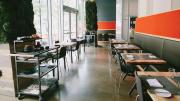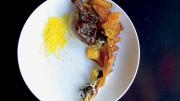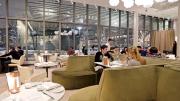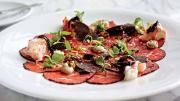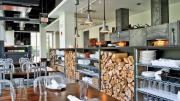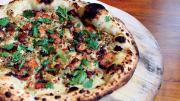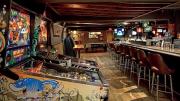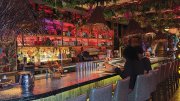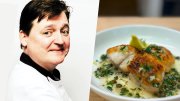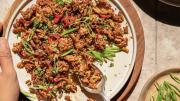Once a cluster of electric power plants, factories, and other “dirty” industries, the Kendall Square area in Cambridge has been masterfully redeveloped since the 1990s. Powerful economic and academic interests, such as MIT, have transformed the roughly 10-acre zone into a global hub of innovation and technology. More than 200 companies—hi-tech, biotech, info-tech, pharmaceutical, and promising startups—are housed in sleek office towers, while sleek apartment towers house many of their employees. That commercial mix, complemented by two and a half acres of landscaped open space and plazas, is calculated by planners to yield a thriving community of successful professionals bent on enjoying urban luxuries—and a range of restaurants has sprung up to serve the “hubbers,” and everyone else who cares to join them.
Study, run by the owners of Journeyman and the hip Backbar in Union Square, serves small plates of exquisite fare that does ask for a degree of devotional analysis. What chef Nick Anichini is doing with food is boundary bending, an art form, and therefore exciting to fanatical foodies. Mainstream diners might see it differently.
The duck prosciutto ($14) arrived, and we all gazed at the plate: dark red curls of flesh were nestled beside a cocoon-like mound of rye spaghetti drenched in a glistening brown liquid. “That looks like something that I saw at work today,” our friend the anesthesiologist said. Nobody asked what. But any awkward thoughts vanished at the first bite of the salty, chewy fowl, which merged with earthy soft pasta and a smack of turmeric in the mouth. A crinkled bit of charred turnip lent bitterness.
More “outdoorsy” was the dish of lion’s mane mushrooms ($9). Crumbly and almost black, they resembled humus, yet tasted meaty. On top were delicately fried kale and squirts of loose-bubbled green foam. The last looked suspicious, but tasted complex: of juicy green apple, kale, and a hint of jalapeño. As the anomalous meal progressed, we adjusted to more such surprises: a cube of tofu in a crunchy, caramelized coating that came with the slow-roasted cauliflower coated in black-garlic yogurt ($17); mussels in a parsley and pumpkin-seed sauce ($11); smoked chicken with leeks, spicy fermented cabbage, and cabbage cream($28); and rounds of venison served with paper-thin slices of green grapes (like dabs of watercolor painted on the plate), endive—some grilled, some turned into chips—and an almond-milk concoction ($17). We thoroughly enjoyed the experience.
Café ArtScience also has experimental origins; it is the brainchild of biomedical engineer and McKay professor of the practice of idea translation David Edwards, founder of Le Laboratoire (an art, design, and science center that fosters interdisciplinary innovation). Despite bright lights and too much white, we liked the interior’s spare, airy feel (and the abundance of plate glass and metal jibes with Kendall Square’s motif). The food is beautiful, refined, and Parisian. Try the nuanced roasted turnip potage with smoked scallops, Meyer lemon, and bacon crumble ($21), the grilled Spanish octopus ($32) with burnt onion, sweet potato, and Calabrian chili ($32), or the beef pot-au-feu, featuring an oxtail broth ($30).
Nearly as pricey is Fuji at Kendall, although it was jammed at lunchtime recently and reservations seemed required. Try to avoid seats at the sushi bar: watching workers toil in tight quarters as the lunch-hour clock ticks away is not relaxing. The deluxe bento box ($20) holds an impressive volume of food: shumai, pork gyoza, California maki, vegetable tempura, white rice, and a slab of salmon teriyaki. All were respectably tasty except for the dried-out, overcooked gyoza. Fresher overall was the vegetarian bento box ($16) with a house salad and tender edamame dumplings. Fuji’s décor is fairly generic (the predominant chrome and glass persist), although wooden tables add warmth.
Wood-oven fires, meanwhile, foster the gregarious vibe at Area Four while cooking up lush pizzas. (The “carnivore” has sopressata, sausage, and bacon, $17.50/$26.50; the caramelized onion and Gorgonzola pie is spiced with green onions, $15/$22.50.) The restaurant caters to all ages and tastes, and has non-pizza entrées such as roasted trout in brown butter ($24) and “mac and cheese” topped with focaccia crumbs ($12), along with thoughtfully combined salads (namely the arugula tossed with fennel, radish, apple, carrot, almonds, flecks of Manchego cheese in exactly the right amount of lemon vinaigrette, $10). Fresh, high-quality ingredients are generously served without hype by a naturally engaging wait staff. The rectangular dining room is noisier in the front (especially by the bar) than at the back, where seats by the floor-to-ceiling windows overlook a grassy courtyard perfect for children who eat fast and want to play outside while their parents linger over another glass of wine.
People can also get loud and happy inside State Park. The place has jukeboxes, shuffleboard, darts, and a pool table, and does a fair job of emulating a 1950s dive bar on a lonely country road. Comfort food with a Southern feel is served—fried deviled eggs ($6), pork sausage and shrimp paella with green beans ($16), Brussels sprouts with horseradish and pomegranate syrup ($10), and “Nashville hot” fried chicken ($19)—yet a zany array of drinks dominates the menu. Tom Collins and Pimm’s Cup come in pitchers, or choose individual shots and beer (“The Woody” is a Budweiser and a fireball, $11.25), or try one of the rotating drafts or craft beers. (The team behind State Park expects to open a Jewish deli, Mamaleh, a few doors down, where West Bridge was. And a new barbecue place, The Smoke Shop, is set to open across the courtyard this spring.)
Commonwealth Cambridge is a hybrid business—market and restaurant—that also evokes what it’s not: an olde-tyme general-store-cum-farm stand. But that’s okay because the simple food is excellent, largely because it changes with the seasons (and often daily), thanks to the owners’ allegiance to local goods. Recently, the menu offered oysters (from Massachusetts and Canada, $3 each), heirloom beet salad ($13), and braised lamb tagine ($26). For dessert, there are custom-made sundaes (about $9), with a choice of fun ice-cream flavors like cinnamon honey, double chocolate cherry, and “birthday cake,” plus syrups and toppings. Or pair the whole shebang with sticky toffee pudding or a Belgian waffle for an extra $4.50. In warm weather, patrons can dine outside, and then take their desserts and walk along the Broad Canal, marveling at all the tall gleaming buildings and the old Boston skyline across the river.
